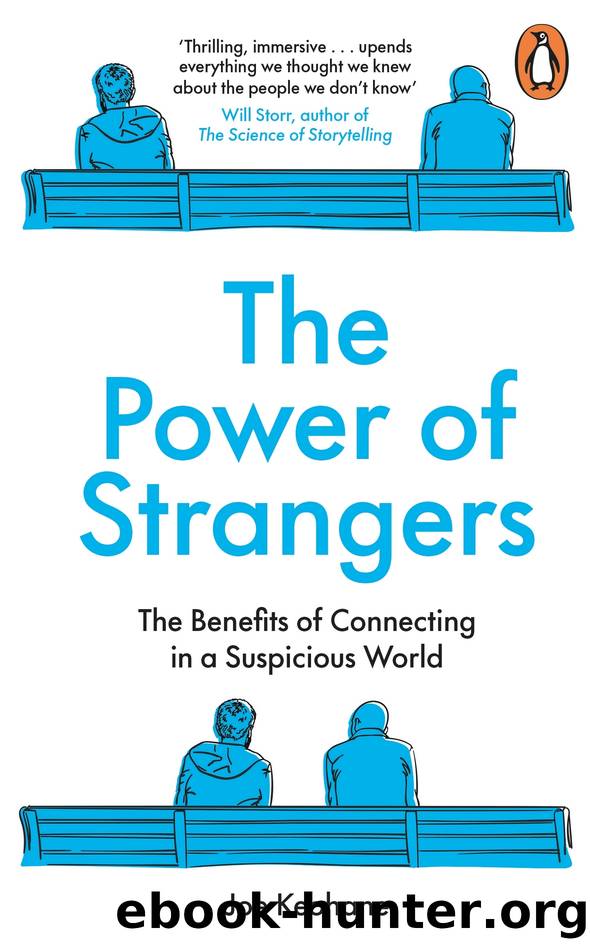The Power of Strangers by Joe Keohane

Author:Joe Keohane [Keohane, Joe]
Language: eng
Format: epub
ISBN: 9780241986431
Publisher: Penguin Books Ltd
Published: 2020-10-02T00:00:00+00:00
Hereâs another example of how friction makes us friendly. Consider the American South, famous for its friendliness and hospitality.fn2 According to a theory by psychologists Dov Cohen and Richard Nisbett, the South is âa culture of honor.â Cultures of honor form in the absence of strong central institutions, like courts or police; they are unstable, and they are characterized by aggression and territoriality. (This is not specifically a southern phenomenon. Cultures of honor appear around the world.) In the South, the culture is believed to have been formed by an eighteenth-century influx of Scots-Irish and Scottish herders from lawless borderlands in northern Ireland and the Scottish Highlands. Because law enforcement was weak both in their homelands and in their adopted region, the men needed to show a willingness to kill anyone who tried to steal their animals. Even mere insults were repaid with violence, for fear of appearing weak and thus vulnerable. From that willingness grew their reputationsâtheir âhonor.â
âCultures of honor, which rely heavily on aggression and male honor, are common adaptations among populations living in stateless regions and that depend upon easily stolen herds,â writes the economist Pauline Grosjean, in a study citing the culture of honor as the reason why the murder rate in the South between 1980 and 2007 is nearly three times higher than the Northâa disparity driven largely by white homicides in instances where honor came into question. Grosjean believes this modern trend arises out of the needs of those early herders. âIn the absence of third party law enforcement, aggression and a willingness to kill can be essential to build a reputation for toughness and deter animal theft.âfn3
The culture of honor declines in the presence of stronger central institutions, and its effect is waning around the world. But elements of it persist today. In a series of studies, Cohen and Nisbett gathered northern students and southern studentsâall menâand placed them in situations where their honor would be insulted. In one, participants were bumped by a large male experimenter in a hallway and called âasshole.â The southern students were angrier about being insulted. The northerners thought it was funny. In another study, participants in a classroom were subjected to heckling and derision by an experimenter posing as a fellow student. Tested afterward, the southerners showed much higher levels of testosterone and the stress hormone cortisol than the northern participants. âAlthough uninsulted southerners were, if anything, more polite than northerners, insulted southerners were much more aggressive than any other group,â Cohen and Nesbitt found.
Thereâs a name for this link between politeness and violence: the paradox of politeness. As Cohen and colleague Joe Vandello wrote in 2004, âViolence and friendliness are usually thought to be opposites. Congeniality, hospitality, openness, and warmth are often assumed to preclude aggression and mayhem. What is frequently missed, however, is how often these two polar opposites seem to go together â¦. Violence, or the threat of violence, can create a society where friendliness, congeniality, and politeness are the norm.â
Again, this is in no way limited to the South.
Download
This site does not store any files on its server. We only index and link to content provided by other sites. Please contact the content providers to delete copyright contents if any and email us, we'll remove relevant links or contents immediately.
Zero to IPO: Over $1 Trillion of Actionable Advice from the World's Most Successful Entrepreneurs by Frederic Kerrest(4577)
Machine Learning at Scale with H2O by Gregory Keys | David Whiting(4314)
Never by Ken Follett(3960)
Harry Potter and the Goblet Of Fire by J.K. Rowling(3864)
Ogilvy on Advertising by David Ogilvy(3625)
Shadow of Night by Deborah Harkness(3372)
The Man Who Died Twice by Richard Osman(3082)
Book of Life by Deborah Harkness(2941)
Will by Will Smith(2928)
The Tipping Point by Malcolm Gladwell(2927)
Purple Hibiscus by Chimamanda Ngozi Adichie(2859)
0041152001443424520 .pdf by Unknown(2849)
My Brilliant Friend by Elena Ferrante(2832)
How Proust Can Change Your Life by Alain De Botton(2818)
How to Pay Zero Taxes, 2018 by Jeff A. Schnepper(2656)
Hooked: A Dark, Contemporary Romance (Never After Series) by Emily McIntire(2561)
Rationality by Steven Pinker(2369)
Can't Hurt Me: Master Your Mind and Defy the Odds - Clean Edition by David Goggins(2344)
Borders by unknow(2319)
